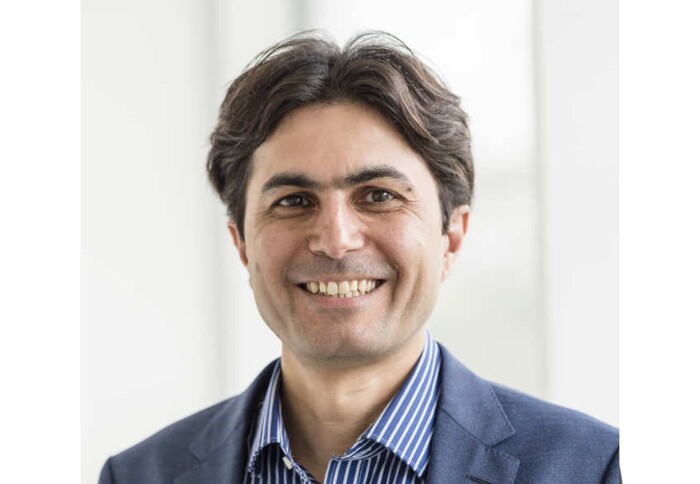Imperial researcher awarded machine intelligence research chair role
by Meesha Patel

Payam Barnaghi was appointed to the Royal Academy of Engineering position in a programme enhancing the links between academia and business.
Professor Payam Barnaghi in the Department of Brain Sciences was recently awarded Great Ormond Street Hospital / Royal Academy of Engineering Research Chair in Machine Intelligence for Medicine. His role will be working with Great Ormond Street Hospital to develop new machine learning models for digital consultation and clinical decision-support in paediatric medicine.
The aim of the RAEng programme is to support academics in UK universities to undertake user-inspired research to meet the needs of industrial sponsors.
We caught up with Professor Payam Barnaghi to talk about this new research and why he was inspired to pursue a career in engineering.
Q: Congratulations on this new appointment. What project will you be working on?
Patients with rare diseases often wait a long time to receive a diagnosis, and this is sometimes because of a lack of access to the right information – such as existing evidence and guidelines – or the necessary clinical expertise. Even when a diagnosis emerges, patients and families may need information about the long-term impact and outcome of such conditions, which may not be readily available. We’re looking at how we can speed up the time to diagnosis of these complex conditions, while also providing patients, families and clinical care teams with data to support their decision-making and ongoing health care.
We’ll use Great Ormond Street Hospital’s routinely collected and secure electronic healthcare records (EHR) to build applicable machine learning models. By de-identifying the data, clinical teams like doctors and nurses can use the models to provide a personalised digital consultation for patients. The methods and the framework will be developed and evaluated at the hospital, but it also has applications to other areas outside of this.
Q: What benefit will this work be to wider society?
This work will contribute to translational machine learning research and development in the UK, advancing the use of AI in the application of real-world healthcare applications.
A key application of this research will be AI-informed decision-support in paediatric medicine, which is a largely under explored area. The models and methods designed and developed in this research will also be applicable to other models that use healthcare records.
Q: Why did you pursue a career in engineering and who inspired you?
I have always been interested in technology and exploring new ways to solve real-world problems. A career in engineering has offered me an incredible opportunity to learn about new technologies and apply design and development methods to complex problems.
Over a decade ago, my grandmother was diagnosed with dementia. Dementia is a neurodegenerative condition affecting memory, cognition, and daily living activities. This led me to shift my engineering passion to clinical problems and the unmet needs in healthcare. Since then, I have extended my research to applying artificial intelligence and data analytics to several healthcare areas, including paediatric medicine. I feel very fortunate to have had an opportunity to work and research in an area where I can apply engineering solutions to improve healthcare outcomes.
Q: What benefits do you think this partnership between Great Ormond Street Hospital (GOSH) and Imperial College London will bring?
The collaboration is an exciting opportunity to use the clinical expertise and anonymised data already held at Great Ormond Street Hospital to design new engineering solutions that can improve the outcomes for patients.
GOSH wants to use its routinely collected clinical data and digital resources to facilitate precise and personalised medicine for its patients, and this project aligns exactly with that aim.
The proposed research and tools will inform and support clinical practice, generating estimated or typical patient journeys based on the treatment options. We will also be able to create reports that can be shared with parents or guardians, something that is especially important in paediatric medicine.
Alongside the research chair position two Imperial College London academics were also awarded RAEng Senior Research Fellow positions:
Dr Mazdak Ghajari, Faculty of Engineering, Dyson School of Design Engineering was awarded the position of Senior Research Fellow in Brain Injury Biomechanics for a project with Sports and Wellbeing Analytics and Cellbond Impact Solutions.
Dr Ivan Stoianov, Faculty of Engineering, Department of Civil and Environmental Engineering was awarded the position of Senior Research Fellow in Dynamically Adaptive Water Supply Networks for a project with Anglican Water Services and Cla-Val UK.
Dr Calvin Tsay, Faculty of Engineering, Department of Computing was awarded the position of Senior Research Fellow in Scale-Bridging Modelling and Optimisation for a project with BASF.
Article text (excluding photos or graphics) © Imperial College London.
Photos and graphics subject to third party copyright used with permission or © Imperial College London.
Reporter
Meesha Patel
Faculty of Medicine Centre